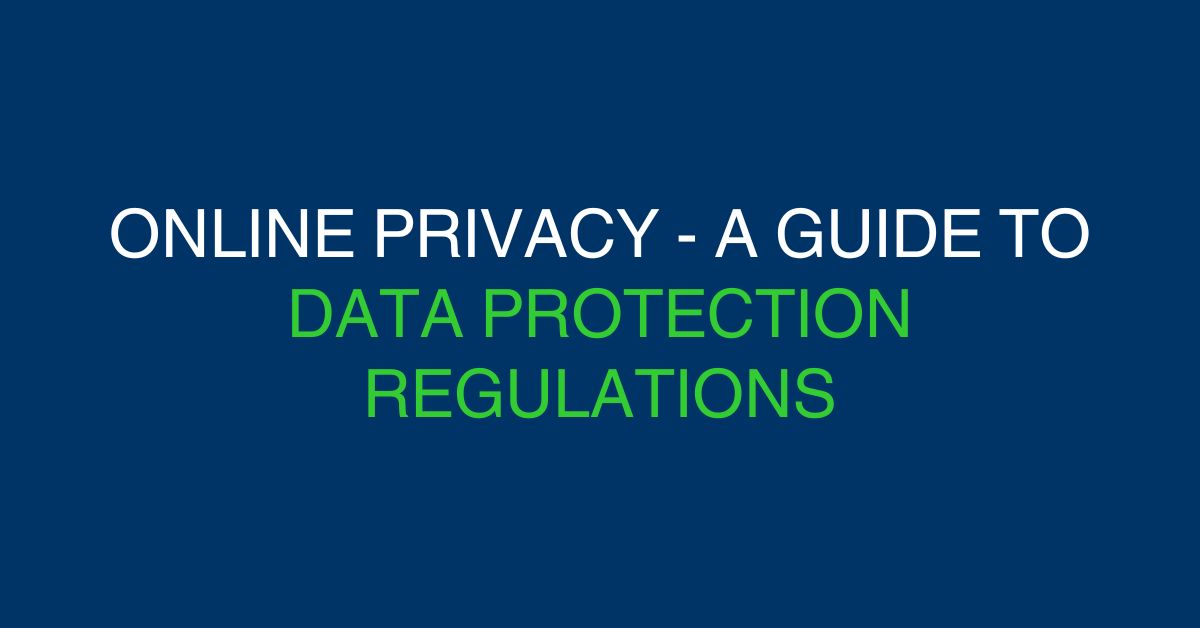We live in an era where digital footprints are as significant as a physical presence. Understanding how to protect personal and business data and knowing your rights is more important than ever. The General Data Protection Regulation (GDPR) and the California Consumer Privacy Act (CCPA) are the main data protection regulations that shape how customer data is handled online and offline.
Each set of regulations offers a framework designed not only to safeguard personal information but also to empower consumers by granting them more control over their personal data. In this article, we will explore and compare these two data privacy laws shedding light on their nuances and the broad impacts of their implementation. Whether you’re a business owner or a person using online services, comprehending these laws will help you better understand your rights and obligations related to digital privacy.
Origins and Objectives of Data Protection Regulations
The inception of GDPR and CCPA was driven by a growing need to address online privacy concerns that have escalated in the digital age. The European Union’s GDPR, enacted in May 2018, arose from a comprehensive review of outdated data protection directives. Its objective was to harmonize data privacy laws across Europe, protect EU citizens’ data privacy, and reshape the way organizations across the region approach sensitive data. GDPR’s broad reach—impacting any organization dealing with EU residents’ data—signifies a global shift towards greater accountability and transparency in data processing.
Similarly, the CCPA, which took effect in January 2020, was California’s answer to the increasing demand for stronger data protection in the United States. It aims to give California residents the power to know what personal data is being collected about them, to decide whether their personal data can be sold, and to have their information deleted from databases. While inspired by GDPR, the California Privacy Rights Act introduces distinct provisions reflecting specific American values such as the emphasis on the right to opt-out of data selling, which contrasts with GDPR’s broader consent model.
Both regulations mark significant steps towards empowering individuals with greater control over their personal information in an increasingly data-driven world. They set out to not only protect customer data but also to instill a culture within organizations that respects and values data privacy as a fundamental right. This section has explored the origins of these influential regulations and their core objectives, highlighting their pivotal roles in the landscape of global data protection.
Key Requirements of GDPR and CCPA
Both GDPR and CCPA are structured around several key provisions designed to enhance data protection and user control over personal information.
Consent and Transparency: GDPR requires explicit consent for data processing and mandates that the process for consent must be clear and distinguishable. The privacy statement must be always available and clearly explain the use of sensitive data. CCPA, while not requiring prior consent for data collection, emphasizes the consumer’s right to opt-out of the sale of personal information, offering a different take on consumer control.
Right to Access and Delete: Under GDPR, individuals have the right to access their personal data and can request its deletion, reflecting the “right to be forgotten.” CCPA grants similar rights, allowing consumers to request the deletion of their data from a business’s records, with certain exceptions.
Data Portability: GDPR introduces data portability, allowing individuals to receive their personal data in a structured, commonly used format. CCPA also touches on this, though its focus is more on the right to know what data is collected.
Data Loss Prevention: GDPR mandates that organizations implement suitable technical and security measures to protect personal data. This includes ensuring the confidentiality, integrity, and availability of data systems, alongside regular testing of their effectiveness.
Protection of Minors: Both regulations address the protection of minors’ data. GDPR prohibits the processing of children’s data without parental consent for those under 16. In contrast, CCPA provides extra protections for consumers under 16, requiring opt-in consent for data sales for those under 13, and parental consent for those between 13 and 16.
Each provision plays a crucial role in safeguarding privacy and shaping how businesses approach data security and compliance, highlighting the nuanced yet stringent landscape of data protection laws.
Compliance and Enforcement of Data Protection Regulations
Navigating compliance with GDPR and CCPA involves a meticulous understanding of each regulation’s enforcement mechanisms and the consequences of non-compliance.
GDPR Compliance: For organizations, GDPR compliance requires a comprehensive data protection strategy that includes appointing a Data Protection Officer (DPO) for certain types of processors and controllers, conducting regular data protection impact assessments, and maintaining detailed records of data processing activities. Non-compliance can result in severe penalties, including fines up to 4% of annual global turnover or €20 million, whichever is greater.
CCPA Compliance: CCPA mandates businesses to implement specific measures such as providing clear “Do Not Sell My Personal Information” links on their websites, maintaining transparent data handling practices, and responding to consumer data requests within specific timeframes. Violations of CCPA can lead to fines of up to $7,500 per violation, which can accumulate quickly depending on the number of affected consumers.
Adapting to Regulations: Both GDPR and CCPA require businesses to be proactive about data privacy. This includes regularly updating privacy policies, training staff on data protection principles, and implementing user-friendly systems for handling data requests.
Global Impact: While GDPR and CCPA originate from specific regions, their impact is global, affecting any organization that handles the data of EU citizens or California residents. This universal reach underscores the importance of compliance for maintaining business integrity and consumer trust worldwide.
Impact on Businesses and Consumers
The introduction of GDPR and CCPA has significantly influenced both consumer behavior and business practices worldwide. For consumers, these regulations have heightened awareness about privacy rights and empowered them to take more control over their personal data. Businesses, meanwhile, have had to adapt to these changes by implementing more transparent data handling and processing practices.
Impact on Business Operations: The need for compliance has led to an overhaul in how businesses collect, store, and use consumer data. Companies now prioritize data security to avoid the hefty penalties associated with breaches of GDPR or CCPA. This shift has also spurred innovations in IT infrastructure, leading to better data management tools and technologies.
Consumer Trust and Engagement: With increased transparency, consumers are more willing to engage with businesses they trust. This trust is based on clear communication regarding data use and consumers’ ability to control their own information. As a result, businesses that demonstrate compliance and prioritize consumer privacy are seeing enhanced customer loyalty and engagement.
Legal and Financial Ramifications: Non-compliance has led to significant legal battles for some corporations, resulting in hefty fines and damaged reputations. These cases serve as a reminder of the importance of compliance and the potential financial risks of overlooking these critical regulations.
Future of Data Protection Regulations
As digital landscapes evolve, so too do the frameworks governing data privacy. Both GDPR and CCPA are likely just the beginning of more comprehensive data protection laws worldwide.
Emerging Global Trends: Several countries and regions are drafting or enhancing their privacy laws, drawing inspiration from the GDPR and CCPA. This trend suggests a move towards a more unified data privacy law, which could simplify compliance for international businesses but also raise the bar for data protection.
Technological Innovations and Challenges: Advances in technology, such as AI and machine learning, present new challenges and opportunities in data privacy. Regulations will need to adapt to ensure they remain effective against increasingly sophisticated data usage and potential breaches.
Anticipating Changes: Stakeholders must stay informed and agile, ready to adapt to new regulations as they emerge. The future of data privacy will require a proactive approach to compliance, continuous education, and a commitment to ethical data use.
Embracing a Privacy-Focused Future
Understanding and implementing data protection regulations like GDPR and CCPA is more than a legal necessity—it’s a strategic move in today’s digital economy. By fostering a culture of transparency and respect for user data, businesses not only comply with these laws but also build deeper trust with their customers, enhancing their brand’s reputation and consumer loyalty.
Looking forward, the landscape of data privacy is set to evolve further as new technologies emerge and more regions adopt a data protection act. Staying informed and agile, ready to adapt to new regulations, will be crucial for businesses aiming to succeed in this changing environment. For consumers, continuing to educate themselves on their rights and how to exercise them will be key to protecting their digital identities.




